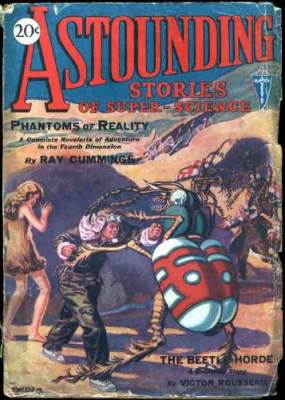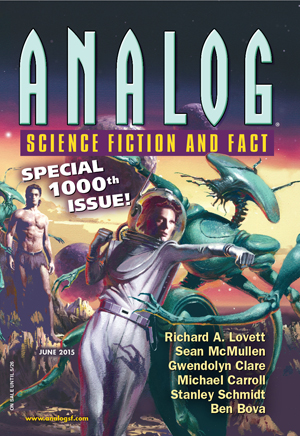Analog’s One Thousandth Cover
Analog magazine, originally Amazing Stories, came out with its one thousandth issue. Here is the original January 1930 cover, showing an aeronaut fending off a bug monster with manly fisticuffs from a cowering cavegirl:
Here is the June 2015 cover, , showing an spacegirl fending off a bug monster with Amazonian yet slender-wristed blow from a dull-faced cavehunk:
I remember a comedian once joking about how much money Neal Armstrong could have made if he had merely stepped on the moon, and, as his boot touched the soil, shouted into his helmet mike: COCA COLA!
Such a joke is funny only if it does not happen. Well, using even a minor historical event as an advert is annoying, particularly when it is an advert for a goofy and misanthropic political movement that stands against everything science fiction stands for.
The idea that male and female are interchangeable, generic and identical is fantasy, not science fiction.
Nonetheless, so much good will is owed Analog, that we ought to forgive this lapse. Not many have the fortitude quietly to stay sane when the world around them goes mad.
Any real lover of SF will seek out Analog. If you have not partaken, you are in for a treat. Aside from WEIRD TALES , I doubt it has an equal in longevity or consistency of producing high quality work and presenting it to the eager reading public.
UPDATE: A reader in the comments section points out this gem, appearing in the Editorial page of the magazine.
“You may notice that there’s one big difference between this cover and the original–there’s no cowering cave-woman being protected by a two-fisted adventurer; this time, she’s more than capable of handling the bug on her own. Taking the things that work without being beholden to the things that don’t is about as Futurist a concept as there is. Oceania was at war with Eastasia: Oceania had always been at war with Eastasia”
Okay, I added that last part.
Futurist = PC BS, then? I cannot bring myself to agree with the equation.
Science fiction stands for the proposition that men using reason, investigating facts, learning the secrets of nature, pose a great benefit in generations to come, a startling humility at learning our small place in the universe, and a great danger if we misuse our newfound powers.
PC is falsehood, usually insolent falsehood, always intolerant falsehood, uttered to humiliate the speaker uttering it, by showing he no longer has control of his own brain nor tongue; and uttered to terrify the listener, who cowers upon discovering one more person once thought sane has been turned into a soulless self-lobotomized serf of Big Brother and a screech-monkey of rampant nonsense.
Science fiction is curious when it comes to science, humble when it comes to man’s place in the scheme of things, and wise when it comes to the dangers of science used shortsightedly.
Political correctness is stupid rather than curious, because it has all the answers, and the answer is that whatever the collective consensus states is the answer. It is proud beyond bounds, holding not merely man the measure of all things, but the collective consensus the source of all answers: like a god, the collective can create truth out of nothing, or make paradoxes logical by mere decree. It is not wise, but frets only about imaginary dangers, and ignores only real ones. Political Correctness is the rarefied essence of folly mingled with the pride of devils and the lethargic dogma-drugged piggish ignorance of brains that deliberately blind themselves.
SF does not equal PC. SF is the direct opposite.
Had the editor not make this condescending remark, I might have bought or submitted stories to Analog in times to come. Not now.
No one can be a PC editor and also be an SF editor. No one who likes PC can like SF. The more you have of one, the less you have of the other.
If the PC in Analog has grown to the point where the editor can pen this blatant blither without fear of any answering uproar among the readers and writers, then Analog is no longer an SF magazine, our beloved Analog, who once was the greatest of them all.
This is like seeing Rome after the fall, the Colosseum empty, the wall toppled and aqueducts broken, the glorious statues fallen and mighty temples shattered, and goatherds watching flocks on the Palatine hill, cropping grass that grows between the roadstones and the tiles of what were once the floor mosaics of palaces.


